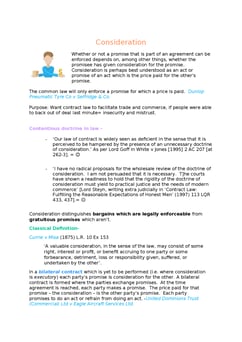White v Bluett [1853] 23 LJ Ex 36
Judgement for the case White v Bluett
Table Of Contents
KEY POINTS
To admit the son’s promise not to complain as consideration would be to allow anything of negligible value to constitute consideration in which case the idea of a trade of benefits in a contract would be lost.
The son had “no right to complain” since his father could do as he wished with his money, and therefore it would be absurd to construe it as consideration that the son would desist from something he had no right to do. The key point is that there is no value in an agreement not to whinge.
FACTS
The plaintiff, Mr. White, was the executor of his late father's will. The defendant, Mr. Bluett, was the son of the deceased.
Mr. Bluett owed a debt to his father, which was acknowledged in the will. To satisfy the debt, Mr. Bluett executed a promissory note to his father, stating that he would refrain from making any further complaints or claims against his father's estate.
However, after his father's death, Mr. Bluett was sued by Mr. White for the outstanding debt. As a defence, Mr. Bluett counters that it lacked consideration and therefore was not a legally binding contract.
COMMENTARY
The court's decision reflects the longstanding principle that nominal or illusory consideration is insufficient to support a contract.
This case also highlights the importance of distinguishing between real consideration and mere gestures. In situations where a party asserts that a promise constitutes consideration, the courts will carefully examine the nature of the promise and whether it represents a genuine exchange of value or is merely a pretence.
ORIGINAL ANALYSIS
Defendant was sued by the executor’s of his father’s will for an outstanding debt.
Defendant claimed that his father had cancelled the debt in return for Defendant’s agreement not to annoy his father with complaints about not receiving the same inheritance as his siblings.
CA said no contract.
Pollock CB
To admit this as consideration would be to allow anything of negligible value to constitute consideration in which case the idea of a trade of benefits in a contract would be lost.
Secondly, he says that the son had “no right to complain” since his father could do as he wished with his money, and therefore it would be absurd to construe it as consideration that the son would desist from something he had no right to do.
The second argument is dodgy: his “right” is freedom of speech. The key point is that there is no value in an agreement not to whinge.
RELATED CASES
For Further Study on White v Bluett

Contract law notes fully updated for recent exams at Oxford and Cambrid...
Need instant answers? Our AI exam tutor is here to help.
Ask questions 🙋 Get answers 📔 It's simple 👁️👄👁️
Our AI is educated by the highest scoring students across all subjects and schools. Join hundreds of your peers today.
Get StartedRelated Product Samples
These product samples contain the same concepts we cover in this case.

 Since 2010, Oxbridge Notes has been a trusted education marketplace, supplying high-quality materials from top achievers at universities like Oxford, Cambridge, LSE, Harvard, and Yale.
Since 2010, Oxbridge Notes has been a trusted education marketplace, supplying high-quality materials from top achievers at universities like Oxford, Cambridge, LSE, Harvard, and Yale.